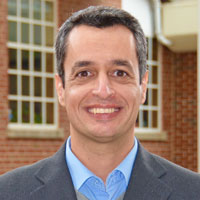Jaff co-authors survey of Syrian refugees in Jordan who could benefit from palliative care
February 28, 2018
A new exploratory study by a UNC Gillings School of Global Public Health faculty member and a UNC alumna found that Syrian refugees in camps and communities in Jordan would benefit from palliative care services currently unavailable to them. The work is an effort to document and begin to improve the dire circumstances of the more than 700,000 Syrians who have fled into Jordan to escape war in their native country.
Dilshad Jaff, MD, MPH, adjunct assistant professor of maternal and child health at the Gillings School and program coordinator for solutions to complex emergencies in the School’s Research Innovation and Global Solutions office, co-authored the article with Isabel Pinheiro, lead author, who earned a bachelor’s degree in interdisciplinary studies at UNC in 2017.
The study, published online Feb. 27 in the journal Medicine, Conflict and Survival, reports on interviews with 21 Syrian refugees in Jordan who have cancer, diabetes, chronic disability or renal failure and with four caregivers for refugee children who have similar life-limiting conditions.
Study participants from the refugee communities often face poverty and isolation and are reliant on charities to fund basic treatments. Especially those with chronic disability felt they would benefit from psychological services and expressed frustration that insufficient medicine was available to pre-empt pain.
Jaff and Pinheiro praised one refugee camp as a role model for the ways palliative (pain-relieving) care can be integrated into existing health care services. After training and certification as a palliative care provider, the clinician in that camp was able to offer spiritual therapy sessions and to provide higher doses of medication to cancer patients.
The researchers report that palliative care clinicians also could intervene with other providers to improve clinician-patient communication, making patients less anxious and more comfortable. As most Syrians are Muslim, religious leaders could be part of the palliative care strategy, especially for terminally ill patients.
Despite the dearth of physical, financial and psychosocial support in many refugee communities, one could hope that those forced from their homeland could retain the glimmer of hope experienced by a 23-year-old man in the study, who said:
This feeling of friendship among everyone – not just the patients [but] the people who work here and the director – makes me feel like family and like this center is my home. This is what helps me the most to heal.
Since the Syrian civil war began in March 2011, more than 6.6 million people have been displaced within Syria, and 4.8 million have left their country. Many of those will not have the good fortune to find the support the researchers say is needed.
Gillings School of Global Public Health contact: David Pesci, director of communications, (919) 962-2600 or dpesci@unc.edu

